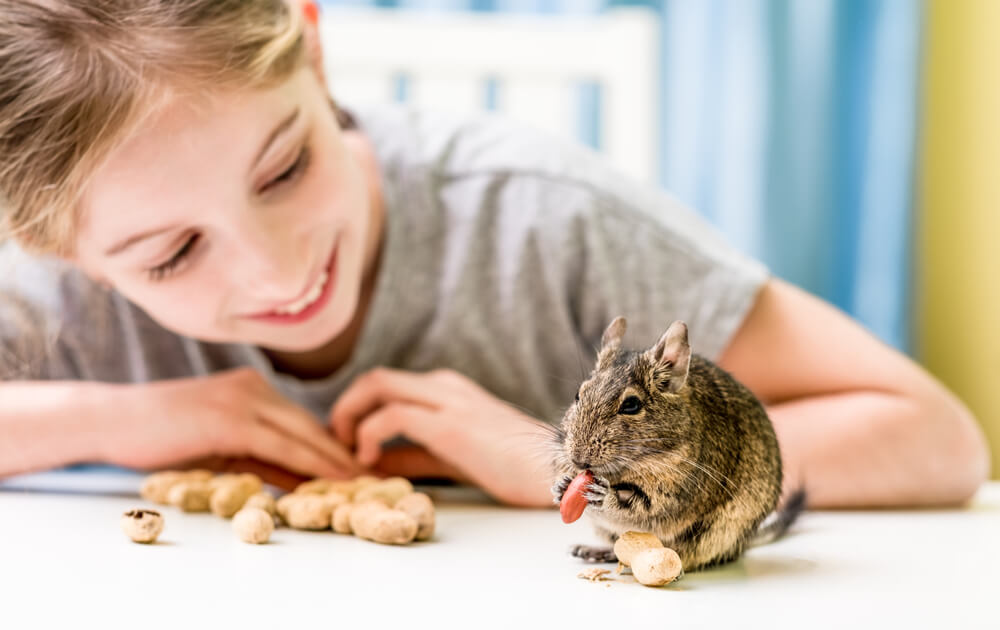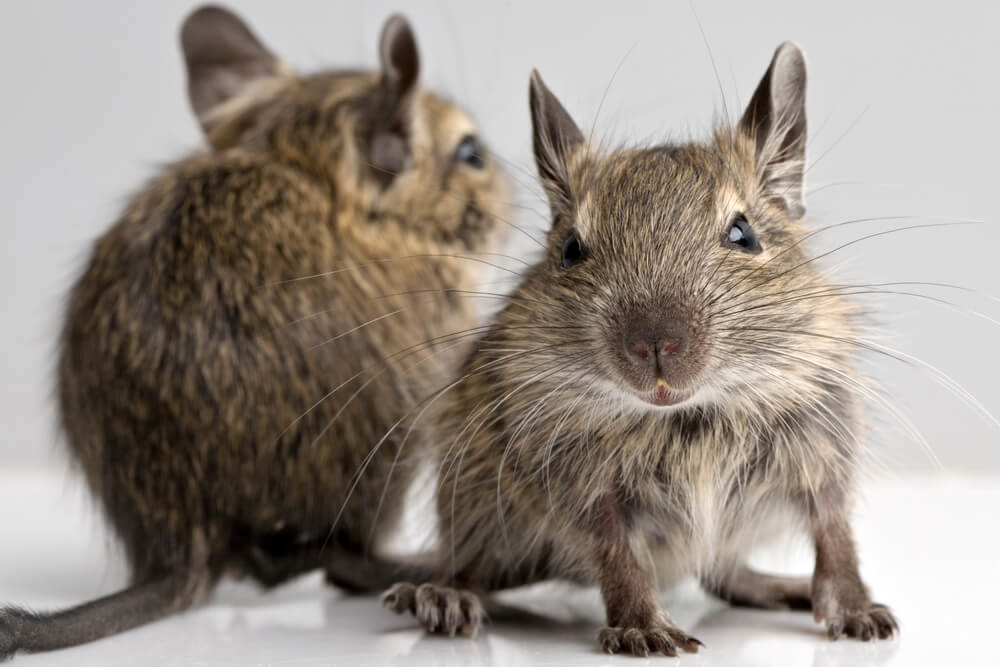A degu is a small mammal native to Chile, and the species is increasingly popular as a pet. These active, inquisitive creatures make lovable companions that are relatively easy to care for when you know what their needs are. Degu health is essential for providing your pet with a long life of joy and companionship. In this article, we cover all things degu health from nutrition and exercise tips to basic vet visits. With our guidance, you can give your little one the best care possible!
Nutrition Considerations For Degus
Good nutrition helps keep your degu in top form. As herbivores, they need plenty of fresh fruits and vegetables in addition to specialized degu food. The small size of a degu makes it difficult for them to digest certain foods, such as lettuce or citrus fruits. To make sure your pet gets enough nutrition, offer them a balanced diet that includes the following:
- High-quality degu pellets
- Fresh hay
- A variety of specifically approved vegetables and small amounts of fruit
- Vitamin supplements (consult with your vet for dosage advice)
In addition to providing fresh food daily, be sure not to leave uneaten pieces in the cage overnight as this can cause spoilage. It is also important that you provide plenty of clean water daily. For more information on feeding a degu, consult with your vet or an animal nutritionist.
Degus tend to be active and inquisitive, so they need plenty of food to keep up their energy. It is also important to watch for signs of malnourishment, such as weak limbs or lethargy. If you suspect that your degu isn't getting enough food, make sure to adjust its diet accordingly and consult with a vet if necessary.
Exercise Tips For Degus
In addition to a healthy diet, exercise is essential for keeping your degu's body and mind in good shape. A degu cage should provide plenty of space for running around and playing games. Make sure to provide toys such as tunnels, ramps, and platforms to encourage physical activity as well as mental stimulation. Degus are social animals and enjoy interacting with their owners, so make sure to spend time playing together in the cage or outside of it.
Another great way to keep your degu active is by providing an outdoor space for supervised playtime. This could be a fenced-in area of your yard or even just a large towel spread out on your floor. Set up obstacles and toys to give your pet something fun to do while they explore their surroundings!
Just remember that since these creatures are indigenous to Chile, they need protection from extreme weather when spending time outdoors—so make sure they have plenty of shade and water during hot summer days or cool shelter during winter months.
Health Care and Vet Visits
Ensuring the health and longevity of your degu goes beyond providing a balanced diet and a safe environment—it also involves regular vet visits. These check-ups play a critical role in early detection and treatment of potential health problems.
Annual Check-ups
It's recommended to bring your degu in for an annual wellness visit. During this check-up, the vet will typically perform a thorough physical examination, checking your pet's weight, teeth, fur, and overall condition. They may also ask about your degu's diet, behavior, and living conditions to assess their general well-being.
Monitoring Changes
As a degu owner, it's crucial to pay attention to any changes in your pet's behavior, eating habits, or physical appearance. Common issues seen in degus include dental problems due to their continuously growing teeth, obesity resulting from an unbalanced diet, and respiratory infections which can be triggered by cold weather or dusty environments. If you notice any unusual changes, schedule a vet visit promptly.
Vaccinations and Parasite Treatments
While degus don't require many of the common pet vaccinations, it's important to stay up-to-date with any treatments recommended by your vet, particularly those related to parasites. Regular treatments can help prevent mites, worms, and other parasites that can severely impact your degu's health.
Common Health Concerns for Degus
Taking care of a degu involves more than just providing food and shelter—it requires a keen understanding of their health needs. These small, lively creatures can suffer from several health issues, particularly if their nutritional and environmental needs are not adequately met.
- Diabetes: Diabetes is a common health issue in degus, and can be caused by a poor diet or obesity. If your degu has been diagnosed with diabetes, it's important to follow the vet's advice closely when it comes to dietary changes and insulin treatments.
- Dental Problems: One of the most common issues affecting degus is dental problems. Degus' teeth continue to grow throughout their lives, and without the right diet to help grind them down, they can overgrow, leading to painful conditions and difficulty eating. Regularly providing your degu with chew toys and a diet high in hay can help prevent this.
- Obesity: Degus love to eat, but an inappropriate diet or overfeeding can lead to obesity. This condition not only places strain on their small bodies but also increases the risk of other health issues such as diabetes and heart disease. Maintain a balanced diet and ensure your degu gets plenty of exercise to keep them in good shape.
- Respiratory Infections: Respiratory infections can be quite common in degus, characterized by symptoms like wheezing, difficulty breathing, and lethargy. If you notice these signs, it's crucial to seek veterinary care promptly as respiratory infections can quickly escalate if left untreated.
- Parasites: Like many pets, degus can be affected by external and internal parasites. Regular vet check-ups can help catch and treat these issues early before they become serious.
- Heart Disease: Degus can also suffer from heart disease, often resulting from poor nutrition or lack of exercise. Feeding your degu a well-balanced diet and providing plenty of opportunities for physical activity can help promote heart health.
Providing the Best Possible Care
Caring for a degu requires dedication and commitment to providing the best possible care. With proper nutrition, plenty of exercise, regular vet visits, and proactive health monitoring, you can help your pet live a long life full of joy and companionship. It is important to remember that the small size of these creatures makes them prone to certain issues like dental problems or obesity—so make sure you are familiar with their dietary needs as well as potential signs of illness or distress.
By following our advice on degu health in this article, you’ll be able to give your little one the love they deserve!







